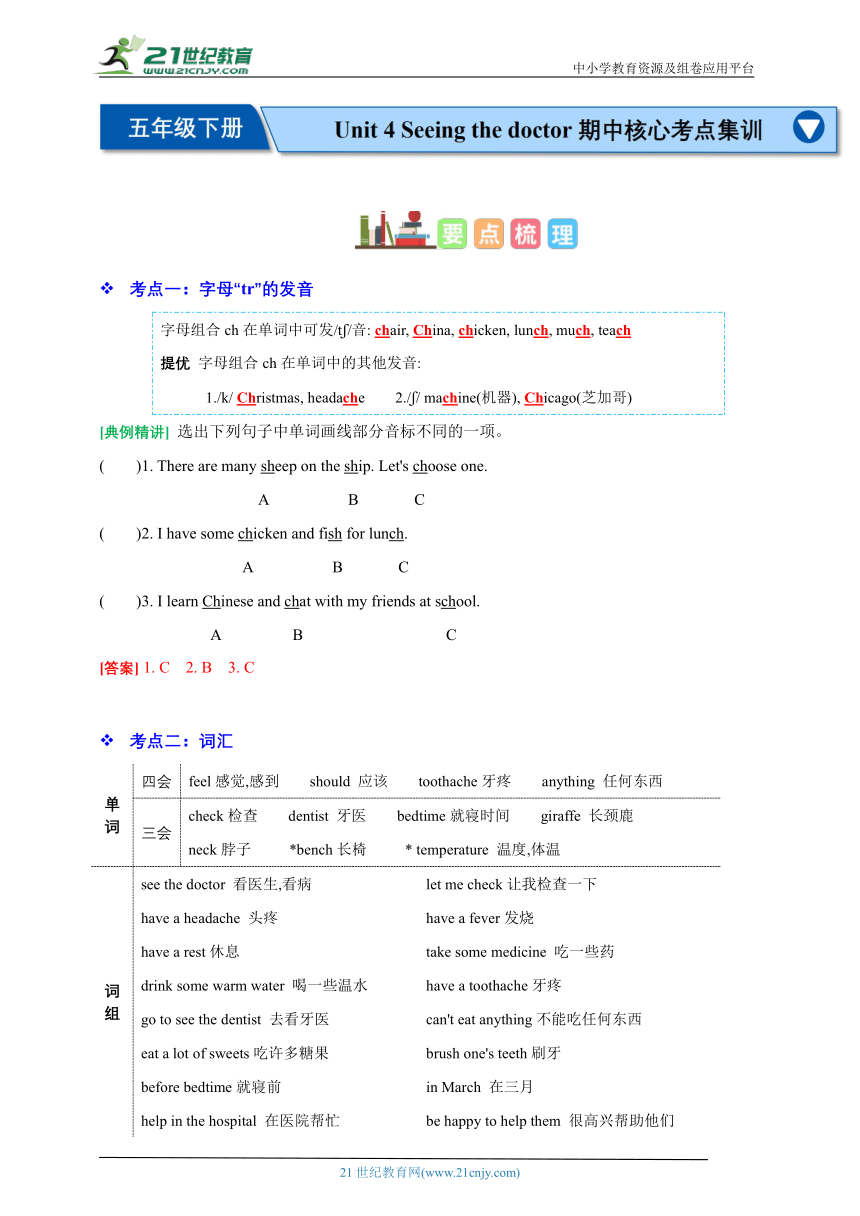
中小学教育资源及组卷应用平台 考点一:字母“tr”的发音 字母组合ch在单词中可发/t /音: chair, China, chicken, lunch, much, teach 提优 字母组合ch在单词中的其他发音: 1./k/ Christmas, headache 2./ / machine(机器), Chicago(芝加哥) [典例精讲] 选出下列句子中单词画线部分音标不同的一项。 ( )1. There are many sheep on the ship. Let's choose one. A B C ( )2. I have some chicken and fish for lunch. A B C ( )3. I learn Chinese and chat with my friends at school. A B C [答案] 1. C 2. B 3. C 考点二:词汇 单词 四会 feel感觉,感到 should 应该 toothache牙疼 anything 任何东西 三会 check检查 dentist 牙医 bedtime就寝时间 giraffe 长颈鹿 neck脖子 *bench长椅 * temperature 温度,体温 词组 see the doctor 看医生,看病 have a headache 头疼 have a rest休息 drink some warm water 喝一些温水 go to see the dentist 去看牙医 eat a lot of sweets吃许多糖果 before bedtime就寝前 help in the hospital 在医院帮忙 can’t hear well听不清楚 feel tired感到累 let me check让我检查一下 have a fever发烧 take some medicine 吃一些药 have a toothache牙疼 can't eat anything不能吃任何东西 brush one's teeth刷牙 in March 在三月 be happy to help them 很高兴帮助他们 point at 指着,指向 talk about illnesses 讨论疾病 考点三:句型 1. Su Hai is ill. She goes to see the doctor.苏海生病了。她去看医生。 2.—What's wrong with you 你怎么了 —I have a headache. I feel cold.我头疼。我感觉冷。 3.—What should I do, Doctor 医生,我应该做什么 —You should have a rest at home. 你应该在家休息。 4. You should take some medicine and drink some warm water. 你应该吃一些药,喝一些温水。 5. Mike has a toothache. He goes to see the dentist.迈克牙疼。他去看牙医。 6. I can't eat anything! 我不能吃任何东西! 7. You shouldn't eat too many sweets.你不应该吃太多糖果。 8. You should brush your teeth in the morning and before bedtime. 你应该在早上和睡觉前刷牙。 9. Why does he have a toothache 他为什么牙疼 10. Bobby is very happy to help them.博比很乐意帮助他们。 11. How do you feel now 你(们)现在感觉怎么样 12. My neck hurts.我的脖子疼。 考点三:语法 语法1:看病的常用表达 1. 询问病情 句型“What’s wrong with … ”意为“……怎么了 ”,通常用来询问他人的健康状况或遇到了什么麻烦=“What’s the matter with … ”。 with后面如果接的是人称代词,人称代词要用其宾格形式。 例如:—What's wrong with you 你怎么了 —I have a cold.我感冒了。 —What's the matter with Mike 迈克怎么了 —He has a headache.他头疼。 2. 描述病情 句型“主语+have/has+a/an+疾病名称.”意为“……得了某种疾病” 还可以用“主语+have/has+got a/an+疾病名称.”表示。 have got 意为“具有,拥有”,相当于 have,在句中意为“患了……病”。 例如:He has a high fever. =He has got a high fever. 3. 询问他人的感觉 句型“How+do/does+主语+feel ”用来询问某人的感觉怎么样 回答可用“主语+feel(s)+表示感觉的形容词.”,或“主语+can/can't/don't/doesn't+动词原形+其他.”等对答句进行补充。 例如:—How do they feel now —They feel scared. They can't walk on. [典例精讲] Ⅰ. 单项选择。 ( )1. —What’s wrong with _____ —They _____a cold. A.me ;is B. them; have C. you; have ( )2. —What's wrong with your _____ —It _____. I c ... ...
~~ 您好,已阅读到文档的结尾了 ~~

